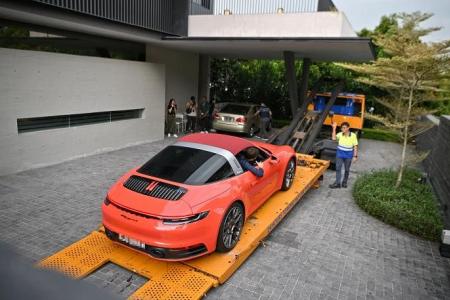Money laundering probe did not impact demand for luxury goods, including prestige cars: Retailers
An ongoing money laundering probe has not impacted the sales of luxury goods here, but retailers say some buyers are now conscious of attracting unwanted attention.
Mr Nicholas Lim, director of Chuan Watch, said that while there has been a dip in the demand for luxury watches, this was on the back of poorer economic sentiment in 2022.
“It’s difficult to link this (dip in demand) to the money laundering case. The economy is not doing well in general, so that might be the cause for any slowdown in the market,” said Mr Lim.
Global growth slowed in 2022 amid higher inflation and an energy crisis in Europe. In Singapore, the economy grew by 3.8 per cent that year, compared with 7.6 per cent in 2021.
Ms Florence Long, founder of luxury bag reseller LuxLexicon, said macroeconomic factors did contribute to a slowdown in sales, but not at a meaningful level.
Said Ms Long: “Local buyers seem completely unaffected, but some foreign buyers don’t want to be seen as being too flashy at this point in time. They still buy the bags they are eyeing, but they don’t use them in public. I can see them exercising more restraint to avoid the spotlight.”
While retailers declined to provide figures, Mr William Tan, manager at Watch Exchange, which sells second-hand luxury watches, said any impact of the money laundering bust on the luxury watch scene may be overstated.
“There’s maybe a 10 to 15 per cent decrease in people buying watches that cost more than $60,000. I think some clients are trying to keep a low profile after the case was reported in August,” he said, adding that sales figures for watches below the $50,000 mark have not changed.
The $2.8 billion money laundering probe cast the spotlight on the lifestyle of the 10 foreigners implicated in the case. Some of them had leased good class bungalows (GCBs) in areas where rents are typically about $100,000 a month.
They also allegedly owned luxury watches, including a $7 million Patek Philippe and a $2 million Richard Mille.
To date, the police have seized 546 pieces of jewellery, 164 luxury watches, 294 luxury bags and thousands of bottles of liquor and wine as part of the investigation. Some of the handbags cost up to $250,000 each.
Chuan Watch’s Mr Lim said he has not noticed any significant change in his clients’ buying behaviour.
“If your money is clean, I don’t see why you should be worried about spending it. The only implication I can see is if a dealer has dealt with any of the accused,” he said.
Property slump
Media reports have linked the ongoing probe to a cooling of Singapore’s luxury property market.
Knight Frank reported that demand for rental properties slipped in the second quarter of 2023, with rents in the ultra-luxury segment falling almost 4 per cent, compared with the 9 per cent gain in the previous quarter.
Meanwhile, high-end bungalow sales are set for their worst year in nearly a decade, with just eight sold as at the end of September, according to data compiled by the real estate company. This compares with 20 mansions sold in 2022.
However, real estate experts, including Ms Christine Sun, senior vice-president of research and analytics at OrangeTee & Tie, have attributed the slowdown in overall sales to buyers turning cautious in the face of higher-for-longer interest rates, slowing economic growth and geopolitical tensions.
Instead of a slump, family-owned jeweller Ivy Masterpiece said the firm’s clientele is in fact growing, and so is clients’ spending.
Mr Ronald Low, a shareholder in the company, said: “We’ve done better every year since Covid-19. We are still on track for that this year.”
He added that bigger spenders are not worried about the ongoing investigation as their funds are from legitimate sources.
Ms Belinda Chua, founder of Flower Diamond, said her clients are long-time customers who have personal relationships with her.
“Our new clients are also usually introduced to us by existing customers and friends, so a certain level of trust is there,” she added.
Regulated dealers of precious stones and metals like Chuan Watch are required to file cash transaction reports (CTR) to the Suspicious Transaction Reporting Office, for cash and cash equivalent transactions that exceed $20,000.
Regulated dealers are businesses that are registered under the Ministry of Law’s Precious Stones and Precious Metals (Prevention of Money Laundering and Terrorism Financing) Act.
Mr Lim said Chuan Watch has also been briefed by banks on verifying customers’ credit cards, signatures and names.
“If customers want to pay for the watches in cash, we will also have to lodge a CTR,” he added.
Mr Low said the Law Ministry briefs dealers in the industry on the Act every year. Ivy Masterpiece also hires accounting firm Deloitte to audit the company, to ensure all records are properly documented.
The report is submitted to the ministry.
“Most of our customers pay by credit cards, so there is a paper trail. We will outright refuse to conduct business with people who try to pay us with stacks of money,” said Mr Low, adding that the firm also conducts its own due diligence when dealing with new or potential customers.
Ms Chen Xiaoxun, marketing director of Supreme Cars, said demand for supercars and luxury vehicles remains high.
“At Supreme Cars, we have not seen a clear reduction of sales of luxury cars. Our sales volume is more directly affected by financial market sentiments,” she added.
Supreme Cars said vehicles under the $300,000 mark continue to sell steadily, and sales of models above $700,000 are holding up well.
The dealer currently has 94 luxury vehicles listed for sale on Sgcarmart, an online platform. They include 13 cars with price tags in excess of $1 million each.
The money laundering case saw 62 vehicles issued prohibition of disposal orders. The police also seized collectibles including Bearbricks, which are produced by Japanese collectible company Medicom Toy.

Bearbrick was introduced in 2001 as a gift to visitors at the World Character Convention in Tokyo.
Falken Toys, which sells Bearbricks, said demand for the collectibles has held up, with interest growing because of the case.
“The community has seen a significant increase in interest and awareness regarding the high value of these collectibles,” said a spokesman.
In total, the police seized 56 Bearbricks, which experts estimate could be worth up to $500,000 in total.
Flashy and noisy
Money managers say their clients are looking at the ongoing investigation with some amusement.
Mr Mario Becker, chief executive of Das Family Office, said: “Our clients are looking at the details of the case, and how the accused had (allegedly) spent so much on rent for their bungalows.”
A family office typically acts as an asset manager for wealthy families.
Mr Becker said families with first-generation wealth are more flashy and noisy, in terms of their spending, something that is not typically seen in established families.
“Our clients are looking to see if there are any good opportunities that will come from the case.
“Many of those engaging in illicit activities tend to be heavily leveraged, so they will have to sell their assets at any price just to raise money. That is when our clients can come in to buy those assets,” he added.
Mr Adrian Koh, head of growth at digital securities exchange Alta, said he has seen a general pullback in spending on luxury goods and assets, with property suffering the most from the money laundering case.
“However, we’ve seen that demand for luxury assets like rare whiskies and premium wines has been resilient throughout 2023.
“We don’t see investors losing faith in luxury goods as an investment, and investors in our community continue to seek opportunities to add them to their portfolios,” he added.
Get The New Paper on your phone with the free TNP app. Download from the Apple App Store or Google Play Store now


